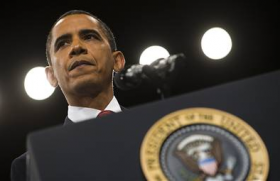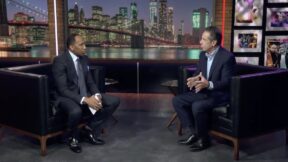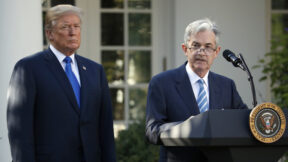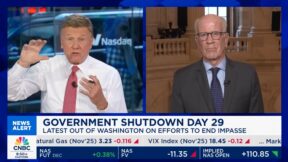Troop Surge in Afghanistan: Some Essential Background
 It would mean that under Feingold’s policy, even as U.S. soldiers began to pull out of Afghanistan, the efforts by the U.S. military to disrupt al Qaeda and the Taliban would increase. A large, nation-building presence, in other words, would transition to a more nimble strike force.
It would mean that under Feingold’s policy, even as U.S. soldiers began to pull out of Afghanistan, the efforts by the U.S. military to disrupt al Qaeda and the Taliban would increase. A large, nation-building presence, in other words, would transition to a more nimble strike force.
It would also mean that the emphasis on nation-building would give way to an emphasis on rooting out corruption. How does that happen exactly? Feingold is not 100% clear, but he does explain that the key to denying al Qaeda a safe have in Afghanistan should switch from a large military presence to a “civilian-led strategy discouraging any support for the Taliban by Pakistani security forces.”
Feingold then went on to make a chilling case for the worse possible outcome that could follow on from an open-ended, U.S. troop build up in Afghanistan (emphasis mine):
There is a very real possibility that our military presence in Afghanistan will drive militant extremists south and east into Pakistan, al Qaeda’s primary sanctuary. Pakistan is a nuclear power beset by poverty, sectarian conflict, ineffectual government, instability and an inconsistent record of fighting militancy. It is a witch’s brew of threats to our national security that we cannot afford to further destabilize. Yet we may unwittingly do just that. Especially before Pakistan’s government has demonstrated a firm commitment to denying sanctuary to Taliban leadership it has long harbored, further destabilization could undermine our own security.
We cannot guarantee, Feingold is telling us, that an open-ended troop build up in Afghanistan with a goal towards nation building will not lead to the destabilization of Pakistan–an already unstable, nuclear state.
September 2, 2009: The Idea of Invading Countries Has Not Worked Very Well
Appearing on NPR’s The Takeway (Sep. 2, 2009) a week after the Wall Street journal piece, Feingold then put his new position on Afghanistan into a broader perspective. This is the exchange between Feingold and NPR’s John Hockenberry and Celeste Headlee:
John Hockenberry: Well let’s get clear here. Are you calling for an invasion of Pakistan?
Sen. Russ Feingold: No, of course not. This is the whole thing. The idea here of going after al Qaeda by invading countries hasn’t worked very well. I mean, yes, we were able to push al Qaeda essentially into Pakistan by invading Afghanistan, but we didn’t eliminate them. In fact, Osama Bin Laden and his deputy and Mullah Omar, who was the affiliate with the Taliban in Afghanistan with al Qaeda, they’re in Pakistan now. So invading a country is not the smart way. The smart way is the way that we got the guy who was in charge of al Qaeda in Iraq — that wasn’t through mass troop involvement. That was through finding out where he was and specifically targeting an attack on him, not the idea of an actual occupation that was the key for that. So, I agree with much of what George Will wrote yesterday. In fact, it was followed on my Op-Ed in The Wall Street Journal on Saturday, that there is a different way to fight a criminal syndicate like al Qaeda. And we’re using old ideas about invasions and occupying countries to go after an organization that sometimes thrives on our doing that. We’re falling into their hands. We’re weakening our military, we’re weakening our economy — that’s exactly the way al Qaeda would like us to proceed. So we are playing into their hands when we use this kind of a strategy. Of course, no, I am against the idea of any kind of invasion against Pakistan. That wouldn’t work either.
Celeste Headlee for The Takeaway: So are you confident that the Pakistani government is strong enough and will be cooperative enough and have targeted attacks within Pakistan to get these al Qaeda officials?
Sen. Russ Feingold: Well, the jury is out on the Pakistan government.John Hockenberry: Been out for eight years, Senator.
What we learn here is that Feingold sees a very different kind of military operation as the key to fighting al Qaeda: targeted strikes within Pakistan, contingent upon two factors: (1) cooperation with the Pakistani government and (2) enough stability in the Pakistani government, such that, U.S. strikes will not bring it tumbling down. And on that issue, Feingold concedes there are still unknowns.
Conclusion: And the Best Answer Is…?
Based on my reading of the situation, it seems that the best solution is to be found neither in the over-the-top hawkishness of the Republican faithful nor the calls for immediate withdrawal from the Democratic Party’s anti-war protesters. If we withdraw altogether, that would lead to more corruption, more heroin, and more al Qaeda camps–very bad. If we bring shock and awe to Afghanistan, that would push al Qaeda deeper into Pakistan and create instability in Afghanistan’s nuclear neighbor–very, very, very, very bad.
The best solution, it seems, is a withdrawal from Afghanistan that starts almost immediately, timed together with a refocusing of military strikes on al Qaeda and Taliban leadership in Afghanistan. As forces wind down, would should also redouble efforts to root out corruption in the Afghan government and in the Pakistani security forces that aid al Qaeda in Afghanistan and Pakistan.
At the same time, President Obama’s message to the American people and the rest of the world should be as clear as it is central to his policy: The U.S. will no longer fight al Qaeda through a strategy of military occupation, but through focused strikes in concert with our allies. Our long term goal is to work with nations facing a threat from al Qaeda to help bring about stability, honest governance, and sustainable rural development.
“More Troops to Afghanistan, Yes or No?”
No–but we may need to switch around the kind of soldiers we have over there as we withdraw and refocus on the last phase of the mission.
At least that makes sense to me. Now that you have had a chance to get up to speed on the Afghanistan policy, you can make up your own mind.
Jeffrey Feldman is the author of Framing the Debate (Ig Publishing, 2007), Outright Barbarous (Ig Publishing, 2008), and founder of Frameshop, the influential blog on politics and language. He holds a Ph.D. in cultural anthropology, which he applies to the analysis of speeches, media, and campaigns. An influential voice both on and in the media, Dr. Feldman is a regular contributor to The Huffington Post, has appeared on PBS, MSNBC, and Air America, and can be seen frequently on CBC Newsworld. This post was reprinted from an earlier post at Frameshop. Photo of Obama by Jim Watson for AFP – Getty Images via MSNBC.com.
Pages: 1 2
This is an opinion piece. The views expressed in this article are those of just the author.




